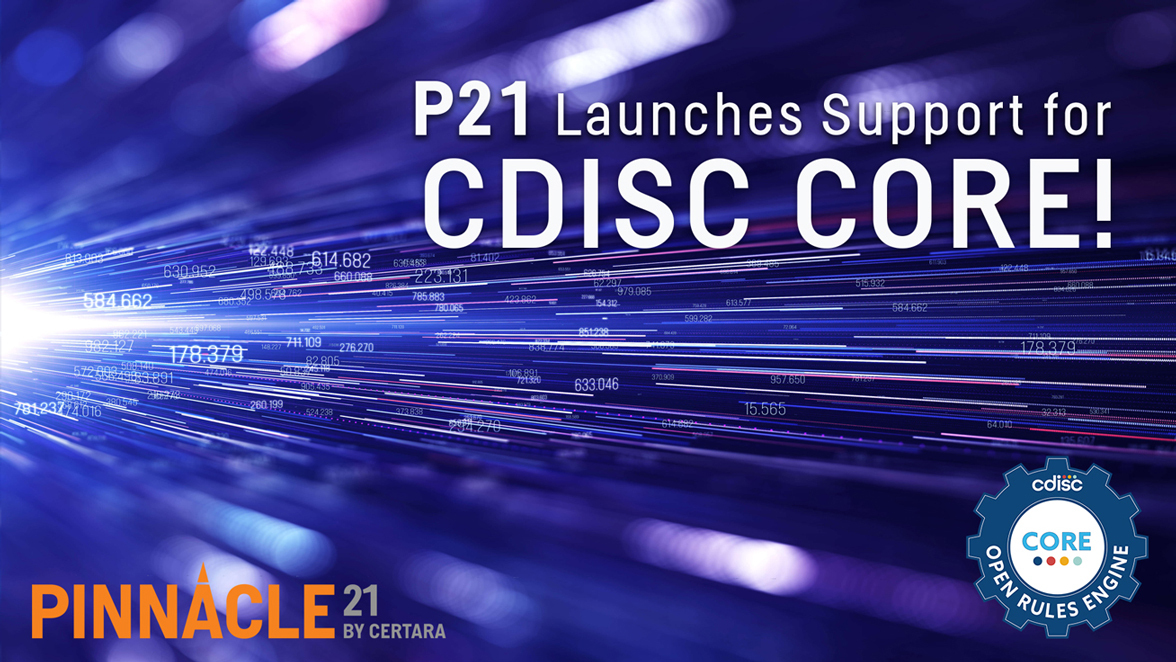Validation
Pinnacle 21 is happy to announce the latest Validation Engines for submissions to Japan PMDA, US FDA, and China NMPA!
P21 has invested much in developing these engines for/with regulatory agencies, and now the industry—whether as users of P21 Community (P21C) or clients of P21 Enterprise (P21E)—can utilize them for expanded standards support, e.g., the first time PMDA has implemented ADaMIG 1.2 & 1.3 and Define-XML 2.1, in their eData submissions to the the global regulatory bodies.
Key details are as follows:
In March 2023, the PMDA published an updated version of its Validator Rules. Pinnacle 21 Principal Consultant Chikaaki Nakao delivered an overview of the differences between newly released version 4.0 and the now legacy version 3.0.
In December 2022, the Food and Drug Administration (FDA) published an updated version of its Validator Rules. Pinnacle 21 Principal Consultant Michael Beers delivered an overview of the differences between newly released version 1.6 and the now legacy March 2021 version 1.5.

P21 is proud to announce that support for CDISC Open Rules Engine (CORE) is now available in P21 Community 4.0. We have expanded CORE’s reference implementation to let you execute machine-readable CDISC Conformance Rules within the familiar P21 toolkit. This new CDISC Engine can run from the desktop GUI or command-line interface (CLI) on any platform in which you have already installed P21 Community.
On December 15th, 2021, the Japanese Pharmaceutical and Medical Devices Agency (PMDA) published its long-awaited update to the validation rules for SDTM, ADAM and Define.xml. PMDA Validation Rules 3.0 introduce additional standard conformance rules from CDISC, support for ADaM-IG 1.1, and many other changes.
At Pinnacle 21, we've got you covered. We have released support for these new rules in our latest validation engine PMDA 2010.2. And in this webinar, we've shared everything you need to know about PMDA Validation Rules 3.0.
New PMDA Engine
Pinnacle 21 is happy to announce the latest Validation Engine for submissions to Japan's PMDA! 🇯🇵
P21 has spent many months developing this Engine with and for the PMDA, and now the industry—whether as users of P21 Community (P21C) or clients of P21 Enterprise (P21E)—can utilize it for expanded standards support, e.g., ADaMIG 1.1, in their eData submissions to the Japanese health agency.
P21 Validation Engine Improvements
The P21 Validation Engines are consistently updated and improved upon with insights from our Subject Matter Experts, consultations with regulatory agencies, and findings submitted by our users. Examples include:
-
AD1012 has been split into two rules: AD1012 and AD1012A. The former checks for custom variables and is a Warning; the later checks for standard variables and is an Error. These rules consider secondary variable names ending in *N or *C, for numeric or character equivalent, respectively.
-
AD0047 was producing problems for some variables but has already been fixed and patched for over a year.
(Originally published on October 6, 2020. Last Updated on October 30, 2020)
Effective October 1st, 2020, China’s NMPA will accept CDISC submissions. To support this initiative, Pinnacle 21 has released a new Chinese-language validation engine, available now in both Enterprise and Community. This engine supports datasets with Chinese-encoded characters and displays rule messages and descriptions in Chinese translation.
Regulatory Expectations
These Data Standards Catalogs from the FDA and PMDA show the valid ADaM-IG versions for your submission’s date.
- FDA currently accepts ADaM-IG 1.0 and ADaM-IG 1.1.
- Note: ADaM-IG 1.0 is only accepted for studies that began prior to the dates below. If your study started on or after these dates, then you can no longer use ADaM-IG 1.0 to submit that study.
- 03/15/2019 for NDAs, ANDAs, and certain BLAs
- 03/15/2020 for certain INDs
- Note: ADaM-IG 1.0 is only accepted for studies that began prior to the dates below. If your study started on or after these dates, then you can no longer use ADaM-IG 1.0 to submit that study.
- PMDA currently accepts ADaM-IG 1.0 only. Note: Unlike the FDA, the PMDA does not grant exceptions for issues in the Reject category.
Intro to ADaM Conformance
ADaM data are required by the FDA and PMDA, and accepted by China’s NMPA. Agencies often begin reviews with ADaM data validation, which helps them understand the analyses performed and reproduce results.
This is the first in a series of posts where we answer questions from our recent webinar, Exploring Common CDISC ADaM Conformance Findings. In this post, we focus on implementation recommendations.





